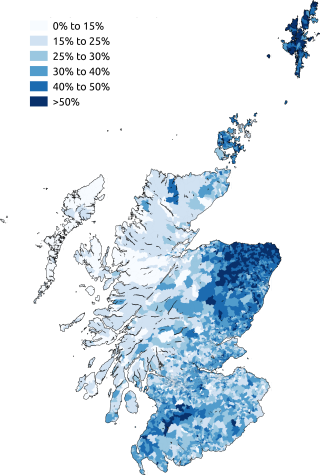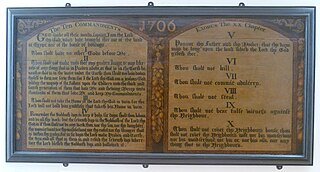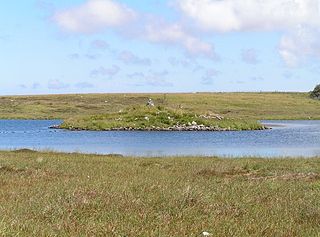In local usage, a burn is a kind of watercourse. The term applies to a large stream or a small river. The word is used in Scotland and England (especially North East England) and in parts of Ulster, Kansas, Australia and New Zealand.
In local usage, a burn is a kind of watercourse. The term applies to a large stream or a small river. The word is used in Scotland and England (especially North East England) and in parts of Ulster, Kansas, Australia and New Zealand.
The cognate of burn in standard English is "bourn", "bourne", "borne", "born", which is retained in placenames like Bournemouth , King's Somborne , Holborn , Melbourne . A cognate in German is Born [1] (contemp. Brunnen), meaning "well", "spring" or "source", which is retained in placenames like Paderborn in Germany. Both the English and German words derive from the same Proto-Germanic root. [2]
Scots Gaelic has the word bùrn, also cognate, but which means "fresh water"; the actual Gaelic for a "burn" is allt (sometimes anglicised as "ault" or "auld" in placenames.)

The Brittoniclanguages form one of the two branches of the Insular Celtic language family; the other is Goidelic. It comprises the extant languages Breton, Cornish, and Welsh. The name Brythonic was derived by Welsh Celticist John Rhys from the Welsh word Brython, meaning Ancient Britons as opposed to an Anglo-Saxon or Gael.
In linguistics, a false friend is a word in a different language that looks or sounds similar to a word in a given language, but differs significantly in meaning. Examples of false friends include English embarrassed and Spanish embarazada 'pregnant'; English parents versus Portuguese parentes and Italian parenti ; English demand and French demander 'ask'; and English gift, German Gift 'poison', and Norwegian gift 'married'.

Loch is the Irish, Scottish Gaelic and Scots word for a lake or sea inlet. It is cognate with the Manx lough, Cornish logh, and one of the Welsh words for lake, llwch.

The letter yogh (ȝogh) was used in Middle English and Older Scots, representing y and various velar phonemes. It was derived from the Insular form of the letter g, Ᵹᵹ.

Scots is an Anglic language variety in the West Germanic language family, spoken in Scotland and parts of Ulster in the north of Ireland. Most commonly spoken in the Scottish Lowlands, Northern Isles and northern Ulster, it is sometimes called Lowland Scots to distinguish it from Scottish Gaelic, the Goidelic Celtic language that was historically restricted to most of the Scottish Highlands, the Hebrides and Galloway after the sixteenth century, or Broad Scots to distinguish it from Scottish Standard English. Modern Scots is a sister language of Modern English, as the two diverged independently from the same source: Early Middle English (1150–1300).
Cumbric was a variety of the Common Brittonic language spoken during the Early Middle Ages in the Hen Ogledd or "Old North" in what is now the counties of Westmorland, Cumberland, northern Lancashire in Northern England and the southern Scottish Lowlands, alongside the Kingdom of Elmet in modern day Yorkshire. It was closely related to Old Welsh and the other Brittonic languages. Place name evidence suggests Cumbric may also have been spoken as far south as Pendle and the Yorkshire Dales. The prevailing view is that it became extinct in the 12th century, after the incorporation of the semi-independent Kingdom of Strathclyde into the Kingdom of Scotland.

A burgh is an autonomous municipal corporation in Scotland and Northern England, usually a city, town, or toun in Scots. This type of administrative division existed from the 12th century, when King David I created the first royal burghs. Burgh status was broadly analogous to borough status, found in the rest of the United Kingdom. Following local government reorganisation in 1975, the title of "royal burgh" remains in use in many towns, but now has little more than ceremonial value.

Kirk is a Scottish and former Northern English word meaning "church". It is often used specifically of the Church of Scotland. Many place names and personal names are also derived from it.

A dun is an ancient or medieval fort. In Ireland and Britain it is mainly a kind of hillfort and also a kind of Atlantic roundhouse.
A bogle, boggle, or bogill is a Northumbrian and Scots term for a ghost or folkloric being, used for a variety of related folkloric creatures including Shellycoats, Barghests, Brags, the Hedley Kow and even giants such as those associated with Cobb's Causeway. They are reputed to live for the simple purpose of perplexing mankind, rather than seriously harming or serving them.

Gullane is a town on the southern shore of the Firth of Forth in East Lothian on the east coast of Scotland. There has been a church in the village since the ninth century. The ruins of the Old Church of St. Andrew built in the twelfth century can still be seen at the western entrance to the village; the church was abandoned after a series of sandstorms made it unusable, and Dirleton Parish Church took its place.

The Norse–Gaels were a people of mixed Gaelic and Norse ancestry and culture. They emerged in the Viking Age, when Vikings who settled in Ireland and in Scotland became Gaelicised and intermarried with Gaels. The Norse–Gaels dominated much of the Irish Sea and Scottish Sea regions from the 9th to 12th centuries. They founded the Kingdom of the Isles, the Kingdom of Dublin, the Lordship of Galloway, and briefly ruled the Kingdom of York. The most powerful Norse–Gaelic dynasty were the Uí Ímair or House of Ivar.

The languages of Scotland belong predominantly to the Germanic and Celtic language families. The classification of the Pictish language was once controversial, but it is now generally considered a Celtic language. Today, the main language spoken in Scotland is English, while Scots and Scottish Gaelic are minority languages. The dialect of English spoken in Scotland is referred to as Scottish English.

The etymology of Aberdeen is that of the name first used for the city of Aberdeen, Scotland, which then bestowed its name to other Aberdeens around the world, as Aberdonians left Scotland to settle in the New World and other colonies.

The etymology of Skye attempts to understand the derivation of the name of the Isle of Skye in the Inner Hebrides of Scotland. Skye's history includes the influence of Gaelic, Norse and English speaking peoples, and the relationships between their names for the island are not straightforward. Ultimately, like other Scottish locations as Islay, Lewis and Arran, the origin of the name is still debated and may be impossible to discern with all known evidence.
Common Brittonic, also known as British, Common Brythonic, or Proto-Brittonic, was a Celtic language spoken in Britain and Brittany.

Scottish toponymy derives from the languages of Scotland. The toponymy varies in each region, reflecting the linguistic history of each part of the country.
B, or b, is the second letter of the Latin-script alphabet, used in the modern English alphabet, the alphabets of other western European languages and others worldwide. Its name in English is bee, plural bees. It represents the voiced bilabial stop in many languages, including English. In some other languages, it is used to represent other bilabial consonants.
A bourne is an intermittent stream, flowing from a spring. Frequent in chalk and limestone country where the rock becomes saturated with winter rain, that slowly drains away until the rock becomes dry, when the stream ceases. The word is from the Anglo-Saxon language of England.